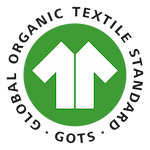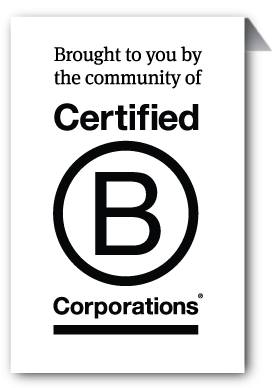- Clothes
- Bags
- Accessories
-
Inspiration
- Shoes
Global Organic Textile Standard

The Global Organic Textile Standard (GOTS) is a globally recognised certification scheme for organic textiles. It was developed to define requirements for the entire textile supply chain, ensuring organic status and socially and environmentally responsible manufacturing.
GOTS is active in every stage of the production process, from first processing of organic fibres, through environmentally and socially responsible manufacturing, to labelling the final product in a transparent, traceable and credible way.
For textile products (from a cotton swab to duvets or clothing) to carry the GOTS label, every stage of the supply chain, including spinning, weaving, dyeing, and sewing, must be certified.
GOTS uses two grades:
GOTS Organic: For this certificate, the product must contain at least 95% certified organic fibres.
GOTS Made with Organic Materials: For this certificate, the product must contain at least 70% certified organic fibres.
Achieving 100% organic content can be difficult because certain components, like zippers or elastic fibres, cannot be made from organic materials. GOTS permits a small percentage of approved non-organic substances, provided they meet strict ecological and toxicological criteria.
GOTS also supports farms in transition to organic agriculture by recognising organic in-conversion fibres. These fibres come from farmland that is being converted to organic practices but has not yet completed the required 3-year period to be certified as fully organic.
Products that contain organic in-conversion fibres contribute to a more sustainable future by supporting farmers during this crucial transition phase. GOTS-certified products made with in-conversion fibres are labelled accordingly.
How GOTS scores on a scale of 1 to 4
Find out what's the story behind your clothing by understanding the certificates. Use the scores to discover at a glance what a certificate means in different sustainability areas.
Cotton cultivation uses 6% of all pesticides in the world and 16% of all insecticides
Eco-Friendly
The environmentally friendly conditions of GOTS apply to the different steps in the production process and also to the different materials. Of course, not all conditions apply to every material or production process. Here are some of the conditions that we considered most important.
- No harmful substances may be used. Examples are GMO (genetically modified organisms), pesticides, heavy metals, microplastics, etc.
- The wet process of processing the materials must take place in an environmentally friendly manner. Wool, for example, may not be treated with chlorine.
- There are strict requirements for the dye that is used and the machines that are used must not use oil that contains heavy metals.
- Wastewater is managed in an environmentally friendly manner. Wastewater cannot be dumped and needs to be sent to a wastewater treatment plant.
- Packaging material must be used sustainably, plastic hangers are prohibited unless they are made from recycled material.
Score: 4/4 for GOTS organic standard, for the x% this score is of course lower.
Fair Trade

The fair trade conditions of GOTS apply to the factories where the clothing and materials are produced, as well as to the farmers. However, it is more difficult to audit the farmers, so the conditions can be taken more strictly for the factories. The main points from the standard are.
- The work is freely chosen (no forced labour).
- Workers have the right to unionize and to collective bargaining.
- There is no child labour (according to local law) and people under the age of 18 are not allowed to perform hazardous and night work.
- There is no discrimination.
- There are safe working conditions.
- There is no intimidation and violence towards employees.
- There are normal working hours. This is in accordance with the local law or industry benchmark (whichever is the most protective), no more than 48 hours per week on a regular basis, at least one day per seven days off and overtime must not exceed 12 hours and are always voluntary.
- Wages should at least be the legal minimum wage or the minimum wage based on the industry benchmark. The highest must be paid out.
- The living wage must also be determined and the wage gap (difference between the paid wage and the living wage) must be calculated from this. GOTS encourages suppliers to close this gap, but it is not a criterium for being certified.
- Immigrant workers are treated well.
Score: 3/4 The social criteria of GOTS are certainly strict, but a living wage is not a condition.

Animal welfare/Vegan
Materials containing animal products (such as wool) must comply with the animal welfare principles, which means good conditions for the animals and in the case of wool means that the wool is mulesing-free.
Score: 2/4 Animal welfare does apply, but it is not necessary to produce without the use of animal products.
Reporting and improvement
Reports are made and suppliers are encouraged to improve on points such as a living wage. However, there are no consequences for not improving. In addition, the reports are not publicly available.
Score: 2/4 There is a report and an incentive for improvement, but there are no consequences if there is no improvement and the reports are not publicly available.
Auditing
To be GOTS certified a party must meet all the criteria of the GOTS standard (applicable to this party). The audit is carried out by a third independent party such as the Control Union. To remain GOTS certified, the company must be audited every year. Depending on a risk analysis, this may also include unannounced inspections.
Score: 4/4 Checks are carried out annually, even unannounced, and by an independent third party.
Check out other certificates

Cradle to Cradle
Cradle to Cradle

B Corp
B Corp

Global Recycled Standard
Global Recycle Standard